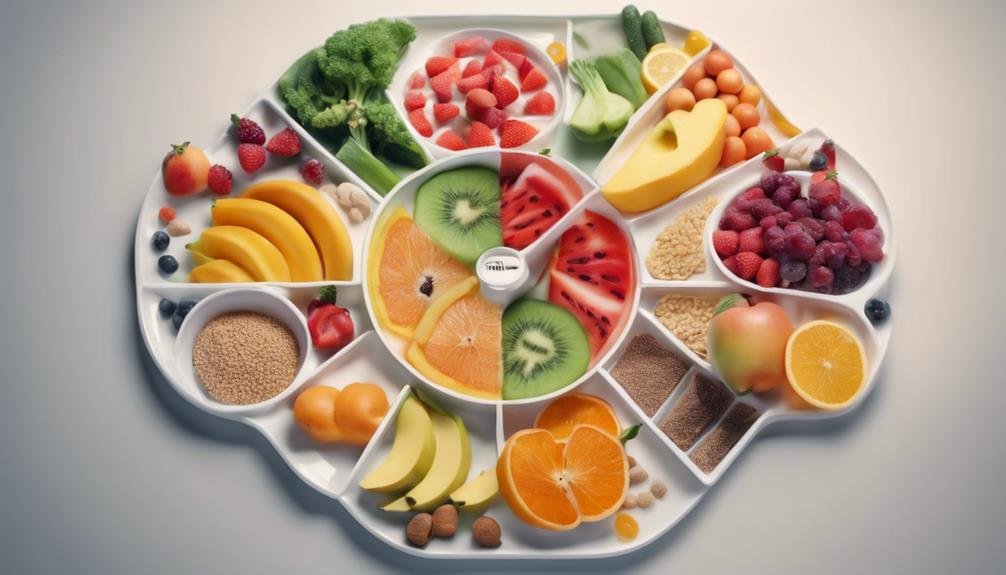"Cherishing Little Steps - A Haven for Baby and Family Journeys"
Encouraging Healthy Eating Habits in Young Children
To foster healthy eating habits in young children, you must understand that it's not just about what they eat—it's about setting the stage for a lifetime of wellness. From the foods you introduce to the way you approach mealtimes, every action shapes their relationship with food.
But how can you navigate the complex world of children's nutrition without feeling overwhelmed? Stay tuned to discover practical strategies that can transform your child's eating habits and overall health.
Key Takeaways
- Nutritious snacks and balanced meals foster growth and well-being in children.
- Parental modeling influences positive food attitudes and habits in young ones.
- Making healthy choices fun encourages children to embrace nutritious foods.
- Involving children in meal prep cultivates skills, curiosity, and positive food relationships.
Importance of Nutritious Foods

Why is it essential to prioritize nutritious foods in the diet of young children for their overall health and development?
Nutritious snacks and balanced meals play a critical role in providing young children with the essential nutrients needed for their growth, cognitive development, and overall well-being. By incorporating a variety of nutrient-dense foods into their diet, you can make sure that your child receives the necessary vitamins, minerals, and energy to thrive.
Nutritious snacks, such as fruits, vegetables, whole grains, and dairy products, can help bridge the nutritional gaps between meals and support steady energy levels throughout the day. Including these snacks in your child's daily routine can prevent excessive hunger, leading to better food choices during mealtime.
Furthermore, serving balanced meals that include a mix of carbohydrates, proteins, healthy fats, fruits, and vegetables is key to promoting healthy eating habits in young children. This variety not only guarantees adequate nutrition but also exposes children to different flavors and textures, helping them develop a diverse palate and a lifelong appreciation for wholesome foods.
Role of Parental Modeling
To instill healthy eating habits in young children, it's important for parents to serve as positive role models by demonstrating good food choices and behaviors. Parents play a critical role in shaping their children's attitudes towards food and nutrition. By consistently making nutritious food choices and displaying positive mealtime habits, parents can influence their children to adopt similar behaviors.
Positive reinforcement is key in encouraging healthy eating habits. Praise and encouragement when children make good food choices can reinforce their behavior. Role modeling healthy choices isn't just about what parents eat but also about how they approach mealtimes. Sitting down together for meals, engaging in positive conversations, and showing enjoyment in eating healthy foods can have a significant impact on children.
Parents should focus on creating a supportive and encouraging environment around food. By involving children in meal planning and preparation, parents can empower them to make healthier choices. Additionally, avoiding negative food talk or using food as a reward can help foster a positive relationship with eating. Remember, your actions speak louder than words when it comes to instilling healthy eating habits in your children.
Making Healthy Choices Fun

Encouraging children to make healthy choices can be made fun and engaging by incorporating interactive activities and colorful presentations of nutritious foods. By making healthy eating enjoyable, you can help instill good habits that will last a lifetime. Here are some practical tips to make healthy choices fun for your little ones:
- Interactive Games: Turn mealtime into a game by creating food-related challenges or quizzes. For example, you can have a 'colorful plate challenge' where kids try to fill their plates with as many different colored fruits and vegetables as possible.
- Creative Recipes: Get your child involved in the kitchen by creating fun and healthy recipes together. Let them pick out a new fruit or vegetable to try and find a creative way to incorporate it into a dish.
- Food Art: Use fruits and vegetables to create fun food art. Encourage your child to make funny faces or animals out of their healthy snacks.
- Smoothie Creations: Have a smoothie-making session where kids can choose their favorite fruits, vegetables, and other nutritious ingredients to blend into a delicious and colorful drink.
Involving Children in Meal Prep
Involving children in meal prep can be a fun and educational way to promote healthy eating habits from an early age. Cooking together not only teaches kids valuable skills but also helps them develop a positive relationship with food. When children are involved in preparing meals, they're more likely to try new foods and make healthier choices.
Family meals are an ideal setting for engaging children in meal prep. Encourage your kids to participate by washing vegetables, mixing ingredients, or setting the table. This hands-on experience can spark their curiosity about different foods and ingredients. Additionally, involving children in meal prep fosters a sense of accomplishment and pride in contributing to family mealtimes.
Setting a Positive Eating Environment

Creating a positive eating environment for young children is essential for fostering healthy eating habits and a positive relationship with food. Here are some practical tips to help you set the stage for positive mealtime experiences:
- Positive reinforcement: Encouraging and praising your child when they try new foods or eat well can help establish a positive association with mealtimes. Celebrate small victories to build their confidence and willingness to explore different foods.
- Family meals: Eating together as a family provides a sense of routine and connection. It allows children to observe healthy eating behaviors from adults and reinforces the social aspect of sharing meals. Make family meals a pleasant and relaxed time where conversation flows, and bonding happens.
- Creating routines: Establishing regular meal and snack times can help regulate your child's appetite and prevent excessive snacking. Consistent routines provide a sense of security and predictability, making mealtimes more enjoyable for children.
- Mealtime environment: Make sure the dining area is free from distractions like screens and toys. Create a calm atmosphere with minimal disruptions, allowing your child to focus on eating and enjoying their food without unnecessary distractions.
Managing Picky Eating Behaviors
To address picky eating behaviors in young children, understanding the factors that contribute to selective eating habits and how to approach them effectively is crucial. Picky eating is common in childhood and can be influenced by various factors such as genetics, sensory sensitivity, and environmental influences.
One effective strategy is increasing food exposure by consistently offering a variety of healthy foods, even if initially rejected. Research shows that repeated exposure to new foods can increase acceptance over time. Encouraging texture exploration is another helpful approach. Children may have aversions to certain textures, but gradually introducing different textures through fun activities like cooking together can help desensitize them.
Educating on Food Nutrients

Understanding the essential nutrients found in different foods is key to promoting a well-rounded and healthy diet for young children. Here are four essential tips to help you educate your child on food nutrients and promote balanced meals:
- Understanding Macronutrients: Teach your child about the three main macronutrients – carbohydrates, proteins, and fats. Explain their importance in providing energy, building tissues, and supporting overall growth and development.
- Food Group Exploration: Encourage your child to explore different food groups such as fruits, vegetables, whole grains, lean proteins, and dairy. Discuss the nutrients each group provides and how they contribute to overall health.
- Meal Planning Together: Involve your child in meal planning. Discuss the importance of including a variety of foods from different food groups in each meal to guarantee they get a good mix of nutrients.
- Fun and Interactive Learning: Make learning about nutrients enjoyable by incorporating games, cooking activities, and food-related experiments. This hands-on approach can help your child develop a positive relationship with food and nutrition.
Practicing Mindful Eating
Practicing mindful eating involves paying full attention to the sensory experience of eating, including taste, texture, and smell, to enhance your overall relationship with food and promote healthier habits. Mindful snacking is a key aspect of eating awareness, encouraging you to savor each bite, chew slowly, and truly experience the flavors and textures of your food.
By being fully present during meals and snacks, you can better tune in to your body's hunger and fullness cues, leading to a more balanced and intuitive approach to eating. Research suggests that mindful eating can help prevent overeating, reduce emotional eating, and improve digestion.
To practice mindful eating, try to eliminate distractions during meals, such as watching TV or scrolling through your phone. Instead, focus on the act of eating, appreciate the nourishment your food provides, and listen to your body's signals. By incorporating mindful eating into your daily routine, you can cultivate a more mindful relationship with food and ultimately support your overall well-being.
Frequently Asked Questions
How Can Parents Handle Situations Where Their Child Refuses to Eat Healthy Foods Despite Their Best Efforts?
When your child refuses healthy foods, it can be tough. Picky eaters may create mealtime battles. Understanding their food preferences and taste preferences is key. Stay patient, offer choices, involve them in cooking, and model healthy eating habits.
Are There Specific Strategies for Introducing New and Unfamiliar Healthy Foods to Young Children?
When introducing new healthy foods to young children, get creative by incorporating variety in meals. Offer positive reinforcement for trying new items, especially for picky eaters. Make food fun and appealing through colorful presentations to pique their interest.
What Role Does Physical Activity Play in Promoting Healthy Eating Habits in Young Children?
To promote healthy eating in young children, physical activity is key. Outdoor playtime boosts appetite and overall wellness. Nutritional education during play can shape dietary preferences positively. Encourage movement and food variety for balanced habits.
How Can Parents Address Peer Pressure and External Influences on Their Child's Food Choices?
When addressing peer pressure and external influences on your child's food choices, remember that your guidance is essential. By fostering a supportive environment, reinforcing healthy habits, and openly discussing media and family dynamics, you empower them to make positive choices.
Are There Any Resources or Support Groups Available for Parents Seeking Guidance on Encouraging Healthy Eating Habits in Their Children?
Looking to guide your child towards healthier eating? Seek out community events and online forums for shared experiences. Consider attending parent workshops or nutrition classes for valuable tips and support in fostering good food habits.
Conclusion
To summarize, by emphasizing the importance of nutritious foods, role modeling healthy eating habits, and making meal prep fun, you can encourage young children to develop healthy eating habits.
Remember to create a positive eating environment, educate on food nutrients, and practice mindful eating to set a solid foundation for a lifetime of good health.
Start small steps today to sow the seeds of success in your child's nutrition journey.


